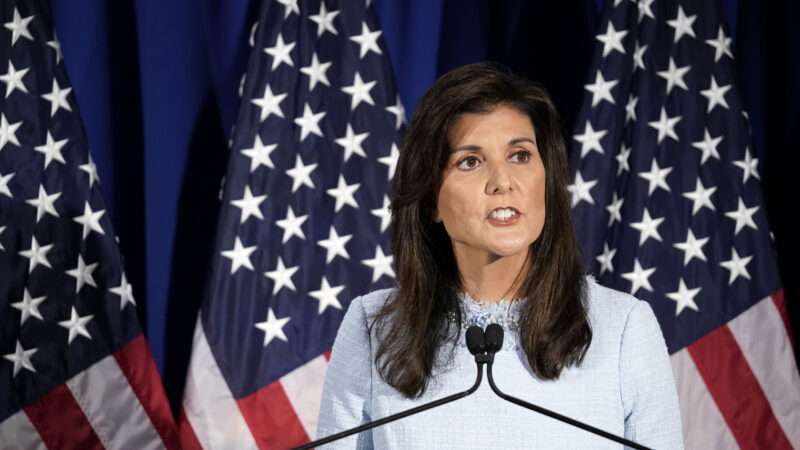
Speaking on Tuesday from the headquarters of the Susan B. Anthony List, a pro-life nonprofit with an associated political action committee, presidential hopeful Nikki Haley set out to do something other declared and anticipated GOP candidates have mostly avoided: She talked at length about abortion.
The subject has occupied a strange place in the 2024 Republican primary—perhaps predictably, as it's been 50 years since we've had a presidential election without the legal framework of Roe v. Wade (1973). Former Vice President Mike Pence consistently and unambiguously presses his pro-life case. But the rest of the field has been noticeably quieter, with former President Donald Trump reportedly telling advisers that he "believes [abortion] is a difficult [issue] for Republicans and not something he should focus his time on," despite his own role in appointing some of the Supreme Court justices who ultimately overturned Roe.
Haley's speech was presumably intended to fill that void, and the former South Carolina governor got her assessment of America's abortion politics half right. She took a large stride toward realism about our deep and intractable division over abortion, swatting down naive fears about what's likely to get through Congress. But then she promptly backtracked, calling for "the next president [to] find national consensus"—a task that would fall well outside of any president's capacity, if it is even possible to do.
The confusion in Haley's thinking is obvious in the path of her argument, which starts with a pointed history lesson. Before Roe, she said, state-based regulation of abortion allowed "the citizens of each state [to reach] a consensus that reflected their values." The federalist approach wasn't perfect, in Haley's telling, because some states chose "more permissive laws," but it's "what the founders of our country envisioned" and "the reality of living in a democracy."
Then, with Roe, the Supreme Court overrode abortion federalism with a single "national mandate that much of the country found deeply offensive," Haley continued. We lived with that—and the resultant culture war animosity—until "last year, [when] the court returned power to the American people. We are now free to forge consensus once again."
But it's not a new federalism Haley wants. Hers is a vision for a "national consensus," and she thinks the next president (which is to say, Haley herself) can craft it.
On the one hand, Haley rightly recognized that a filibuster-proof GOP majority in the Senate "hasn't happened in over 100 years, and it's unlikely to happen soon," which means the "pro-life laws that have passed in strongly Republican states will not be approved at the federal level." Democratic claims to the contrary are, indeed, fearmongering—as are Republican alarms about congressional Democrats nixing pro-life state laws. No sweeping federal abortion regime is on offer from our lawmakers.
But Haley has no similar realism about what a president can actually do here. She seems to think a president can convince pro-choice and progressive Americans that pro-life crisis pregnancy centers are a positive thing, that adoption is an unalloyed good, and that "pro-life doctors and nurses should never be forced to violate their beliefs." And somehow, a president can also convince conservative, pro-life Americans—including Catholics for whom this is a matter of church doctrine as well as politics—"that contraception should be more available, not less."
"Those are just some areas where national consensus is already within reach," Haley insisted. "There are others too," and we can "find them through heartfelt dialogue."
Can we, though? If nice words from a well-intentioned president were all it took, we'd have solved abortion years ago.
If anything, crisis pregnancy centers, adoption, and religious liberty exemptions for health care workers have become more controversial on the left in the last decade or so. As for contraception, well, I'm not sure why the Vatican would care what a President Haley thinks—particularly if she declines to spell out how, exactly, contraception should be "available," which could mean anything from deregulating the pill to forcing Catholic organizations to cover employees' contraceptive care.
The reality is that we're nowhere near national consensus on any of this, and adding the inherently polarizing voice of an American president to the conversation will not make it more "heartfelt." The presidency has become far too powerful, but when it comes to shifting national feeling in an intense moral disagreement—to say nothing of making policy changes a subsequent president can't immediately undo—even that power has its limits. (Ironically, the ever-provocative Donald Trump may be the closest to understanding how little a president can do here.)
At best, presidential involvement in this debate will have zero effect. More likely, it will add to our contention and open up new fronts in this culture war. If a national consensus on abortion ever does exist, it won't be forged in the White House.
The post Nikki Haley Is Half Right About Abortion appeared first on Reason.com.







